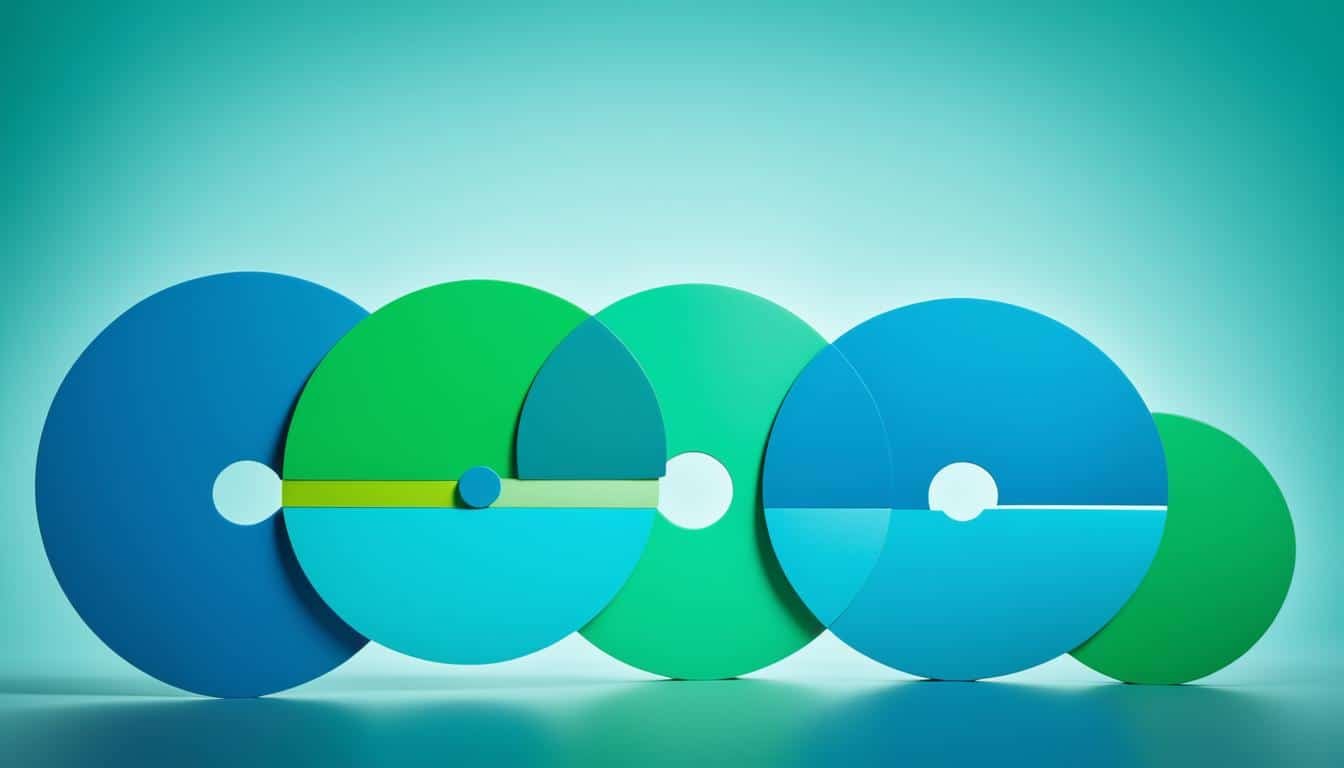How Do I Apply For And Obtain A Credit Card?
Obtain A Credit Card: Starting off on the journey of picking the right credit card means understanding your credit score. This helps narrow down your options to those you’re likely to get approved for. It’s also important to grasp credit card terms and your card goals. These steps further your ability to compare and select the ideal card. When in doubt, consider cards with preapproval. They give insight into approval chances without impacting your credit score.
Key Takeaways
- Knowing your credit score is crucial for finding the right credit card.
- Understanding credit card terms and features can help you compare and select the best card for your needs.
- Checking for preapproval can give you a sense of your approval chances without affecting your credit score.
- It’s important to use your credit card responsibly to build and maintain a strong credit profile.
- Becoming an authorized user on someone else’s account can be a helpful way to build credit from scratch.
Know Your Credit Score
Your credit score is vital for knowing if you can get loans or credit cards. It’s a number from 300 to 850, showing your financial health. This number looks at your credit past, present, and how you handle credit over time. Knowing your credit score is a big help when you want a new credit card.
Understanding Credit Scoring Systems
In the U.S., two main systems figure out your credit score: FICO and VantageScore. FICO looks at what you owe, your payment history, the age of your credit, the types of credit you have, and any new credit you may be seeking. VantageScore considers a wide range of things, like how much credit you use, your credit history, and activities that help build credit.
How to Get a Copy of Your Credit Report and Score
Federal law says you can check your credit report for free once a year from the big three credit bureaus. This includes Experian, Equifax, and TransUnion. Just go to AnnualCreditReport.com. To see your credit score, you might have to buy it from the bureaus or sign up for a service that checks it regularly credit card with no credit.
What to Do If You Don’t Have a Credit Score
If you’re new to credit or don’t have a lot of credit use, you might not have a score yet. You can start to build your credit by sharing someone’s credit card, getting a secured credit card, or getting a loan meant to help you build credit. By using credit wisely and fixing any credit issues, you can make a good credit history and score.
Compare Cards Based on Your Needs
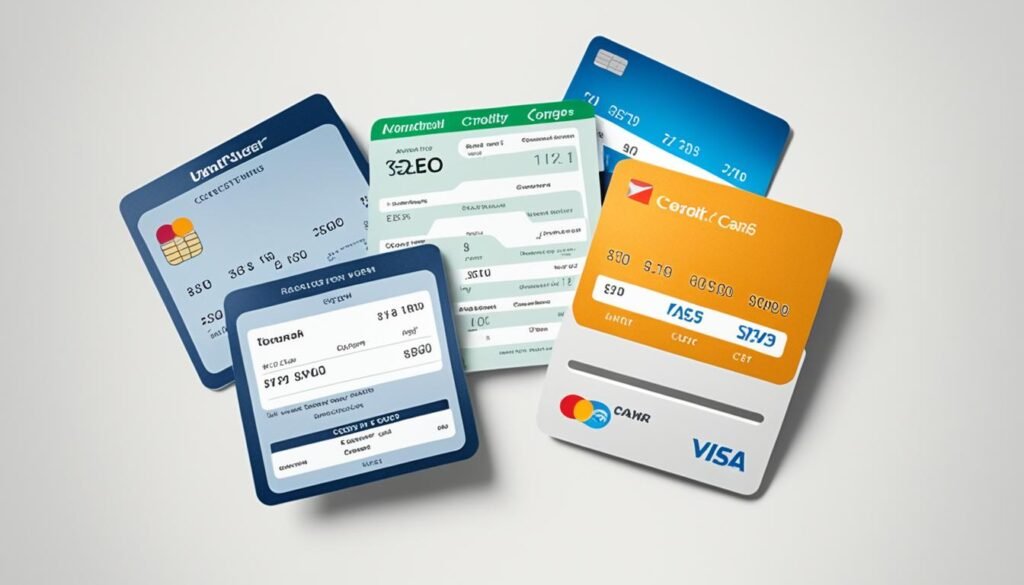
Choosing a credit card is about finding one that matches your money goals and ways you spend cash. By comparing, pick one that gives you great rewards to fit your finance needs.
Considerations for Choosing a Credit Card
First, look into the annual fee, interest rate, and rewards programs every card offers. Decide if no annual fee is important or if you’ll pay for extra benefits. Think about the APR that fits your budget. And consider how you can earn from cash back, points, or miles.
Low Interest vs. Rewards Cards
If you want to lower interest fees, a card with a low interest rate is your best bet. But if you like earning travel rewards or flexible points, a rewards program card might be better. Even if it means the APR is a bit higher.
Cash Back vs. Flexible Reward Points
Decide whether you like cash back or points and miles for various buys better. Cash back is simple to earn and use. Whereas flexible reward points give more ways to use your credit card benefits for travel, food, shopping, and other things.
Learn Key Credit Card Terms
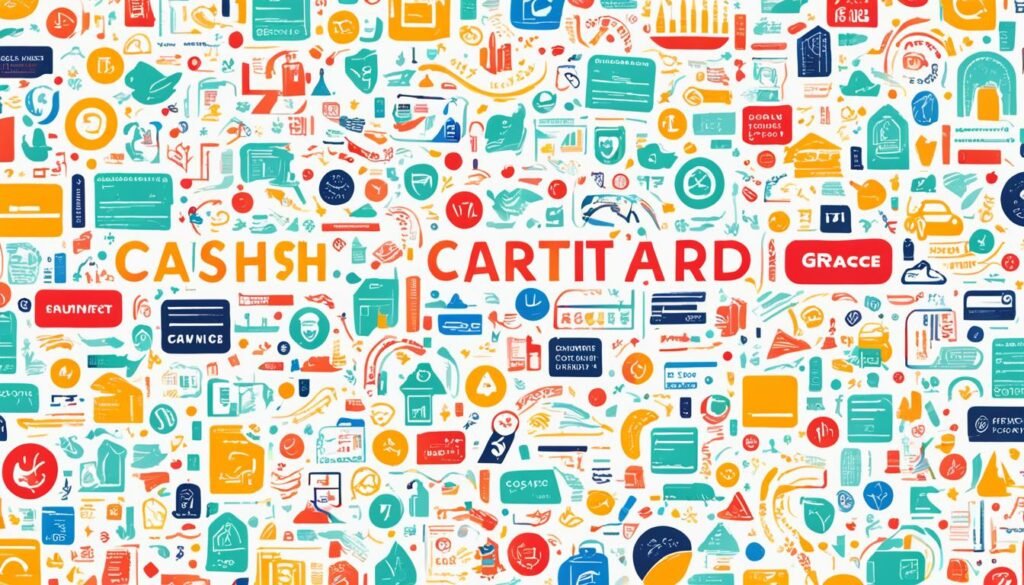
When you sign up for a credit card, you’ll come across many important terms. Knowing what they mean is crucial. It helps you avoid extra fees and make smart choices.
Annual Percentage Rate (APR)
The Annual Percentage Rate (APR) shows how much interest you’ll pay on what you owe. A high APR can make your debt more expensive. It’s smart to look for lower interest rates to save money.
Balance Transfers
Balance transfers move one card’s debt to another at a low rate, often 0% for a while. This method is great for paying your debt faster. Just watch out for any balance transfer fees.
Cash Advances
A cash advance is when you get money from a credit card, like at an ATM. It usually has a high APR and extra fees, making it pricey. Try not to use this option unless you really have to.
Penalty Fees
If you break certain rules, like missing a payment or going over your limit, you may face a penalty fee. These fees can stack up fast. It’s key to know your card’s rules and use it wisely.
Rewards Rates
Lots of cards come with rewards programs. You can earn cash back, points, or miles when you spend. Rewards differ from card to card. It’s wise to choose the one that fits your buying style best.
Check Prequalification Options
When you want a credit card, see if you’re prequalified or preapproved first. Many credit card issuers let you check this. It tells you if you have a good chance of being approved without hurting your credit score. They check your info with a “soft” look that doesn’t leave a mark on your record.
It’s wise to know if you might get a card before you apply. This can help when you’re looking at different credit card offers. Even though prequalification doesn’t mean you’ll be approved for sure, it shows there’s a good chance. This tool is helpful for finding the right credit card for you.
Gather Required Documents
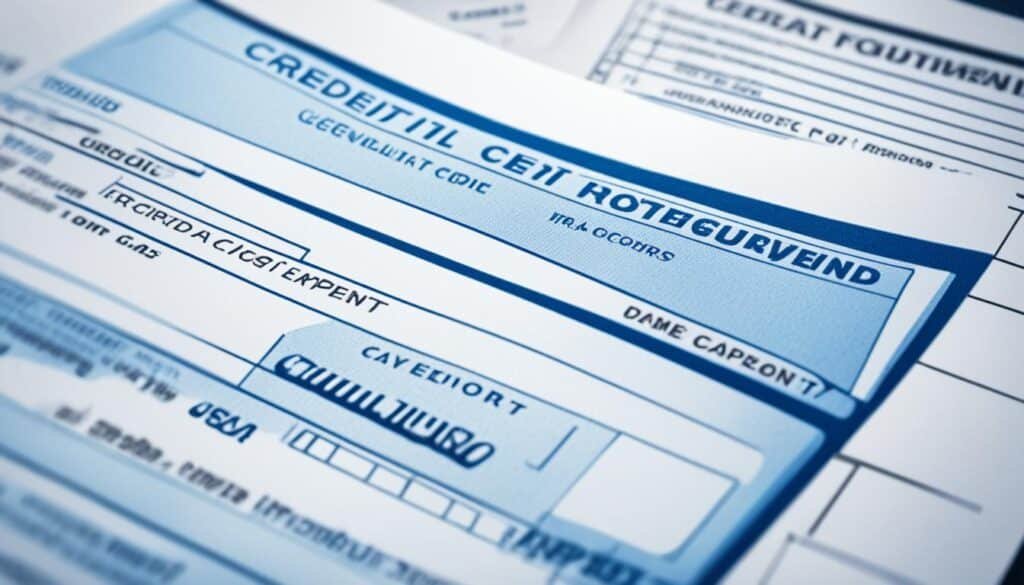
When you apply for a credit card, make sure you have all necessary documents. The credit card application requirements include specific items. Have these ready for a smoother application process.
Personal Information
You must give out personal information. This includes your full name, date of birth, and address. The issuer needs it to check your identity and see if you qualify for the card.
Income and Employment Details
The issuer will ask for your job and how much you earn. They need income verification and employment details to know if you can pay back on time. Tell them if you have any other sources of money too.
Debt Information
The company might also want to know about your debt information. This could be loans and other debts. They look at this to see if you are a good candidate for the card.
Improve Your Chances of Approval
Before getting a new credit card, do some things to up your approval odds. Firstly, clear up any debts you owe. It’s vital to pay off delayed or missed payments quickly. Doing this shows lenders you know how to handle your debt well.
Clear Outstanding Debts
Your credit balance and available credit ratio is critical, too. Lowering your credit share can boost your score. Try to use less than 30% of your credit. Lenders see this as a positive sign.
Decrease Credit Utilization Ratio
Having realistic views when applying is key. First, check what cards you qualify for. This saves you from applying to those you won’t get approved for. Knowing your credit situation is smart. It helps in making choices that lead to positive outcomes.
Set Realistic Expectations
Follow these pointers for a better chance at getting a credit card. It’s also a step forward in managing your money better. Always use your card responsibly and keep an eye on your debt. This builds a better credit record over time.
Obtain A Credit Card
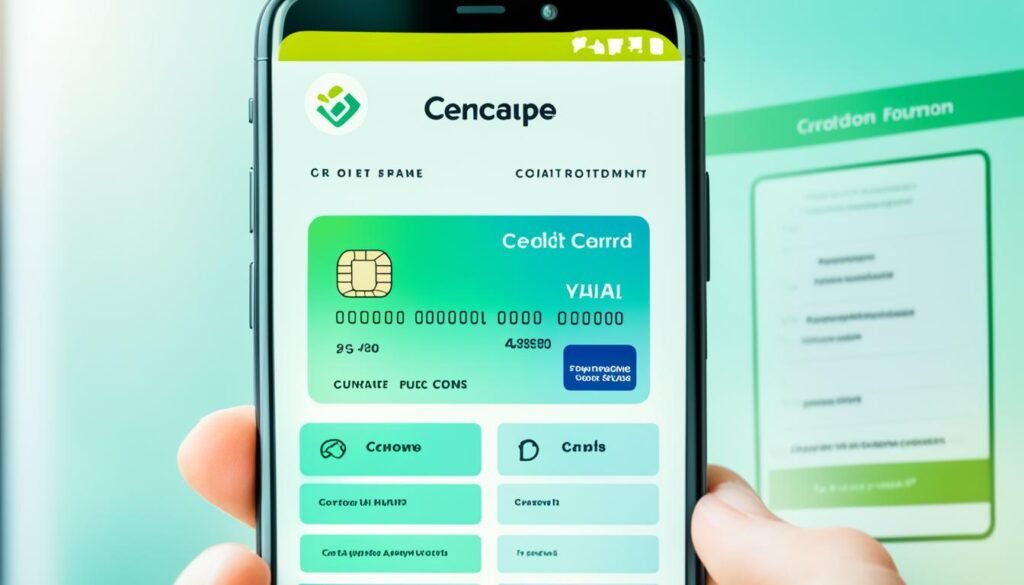
There are several ways to apply for a credit card:
Applying Online
Many credit card issuers let you apply online. This makes it easy to research and compare. You can do this from home or anywhere. You’ll fill out the whole application and provide your info online, safely.
In-Person Applications
If you like a face-to-face setup, you can also apply in person. Just head to a local bank or credit union. There, you can talk to someone about the cards they offer. This can be a good option if you have questions about how things work.
Phone and Mail Applications
You can also give them a call or mail in your application. When you call, a helpful rep will guide you and answer any questions. If you prefer to take your time, mail applications can be better. This lets you carefully consider the card details and fill out the forms on your schedule.
| Application Method | Convenience | Interaction | Approval Timeline |
|---|---|---|---|
| Online | High | Low | Faster |
| In-Person | Medium | High | Medium |
| Phone | Medium | High | Medium |
| Low | Low | Slower |
Use Your Credit Card Responsibly
If your credit card application is approved, congrats! Responsibly, a credit card can cover your expenses and boost your credit score for the future. Here are some habits for smart credit card usage:
Make On-Time Payments
It’s key to make on-time payments. This is vital for managing your credit score and creating a good credit history. Use auto-pay or set reminders so you never forget a due date.
Keep Balances Low
Try to have low credit balances, aiming for under 30% of your credit limit. A low credit utilization shows you’re using your credit wisely. It can also raise your credit score.
Monitor Your Credit Reports
Keep an eye on your credit reports from the top three bureaus. This helps you catch mistakes or shady actions early. Then, work to keep or boost your credit over time.
By keeping up with these good credit card use ideas, you can strengthen your credit profile. It sets you up for success in long-term credit building.
Become an Authorized User

Starting to build credit from scratch? Or need to fix credit problems? Being an authorized user is a wise move. This means you can use someone else’s credit card, usually a family member’s like a parent. It helps you start or repair your own credit history and profile. You ride on the good credit history and use of the main cardholder.
Being an authorized user is smart for credit building. It lets you share the main card’s positive credit. This is great for young adults or those with little experience. You get to watch and learn, setting up a good credit profile for yourself later on.
It’s a key method for handling personal finances and improving your credit track record. Just talk a lot with the main account holder. And of course, use the card wisely. This can really boost your credit standing.
Also Read: How Do I Apply For And Obtain A Credit Card?
Conclusion
Getting a credit card can help you to build and keep good credit. To succeed, know your credit score. Compare different cards and be smart with how you use yours. Also, check out prequalification options. Have all the needed documents ready, and try to boost your approval chances.
With a good credit card and wise financial habits, you can reach your financial goals. You’ll also make a solid credit profile. Using your credit card responsibly means paying on time and not spending too much. This will help you build credit and meet your personal finance goals.
Be careful and smart when you apply for a credit card. Understand all the important terms and things that might affect your credit management. By being careful, you can use credit cards to help you in your financial journey.
FAQs
Q: How can I apply for my first credit card?
A: To apply for your first credit card, you can visit the website of the credit card issuer or apply in person at a local branch. Make sure to have all required documents handy, such as proof of income and identification.
Q: What is the best credit card for someone with no credit history?
A: For individuals with no credit history, a secured credit card can be a good option to start building credit. Look for secured cards that report to the major credit bureaus to establish a positive credit history.
Q: How do I check my credit score before applying for a credit card online?
A: You can check your credit score for free through various online platforms or by requesting a free credit report from the three major credit bureaus. Knowing your credit score can help you determine which credit card offers may be best suited for you.
Q: What are the benefits of a rewards credit card?
A: Rewards credit cards allow you to earn rewards such as cash back, travel points, or discounts on purchases. By using a rewards credit card responsibly, you can benefit from perks and savings on your everyday expenses.
Q: Will applying for a new credit card hurt my credit score?
A: Applying for a new credit card may result in a temporary dip in your credit score due to the hard inquiry made by the card issuer. However, responsible credit card use can help improve your credit over time.
Q: What should I consider when choosing the right credit card for me?
A: When choosing a credit card, consider factors such as your spending habits, rewards preferences, annual fees, interest rates, and benefits offered by the card issuer. Select a card that aligns with your financial goals and needs.
Q: How can I build my credit history with a credit card?
A: You can build your credit history by using your credit card responsibly, making on-time payments, keeping your credit utilization low, and avoiding carrying a balance. Consistent positive credit habits can help improve your credit score over time.
Source Links
- https://www.forbes.com/advisor/credit-cards/how-to-apply-for-a-credit-card/
- https://www.capitalone.com/learn-grow/money-management/how-to-apply-for-a-credit-card/
- https://www.bankrate.com/credit-cards/news/how-to-apply-for-a-credit-card/
